
Employee Told To “Actually Read The Company Policy” Maliciously Complies, Gets Extra $300
Corporate life can be annoying with its heaps of office policies and bureaucracy. Let’s face it, no employee wants to read that 100-page guidebook of dos and don’ts. Still, knowing the company’s policies can sometimes work in favor of the worker.
One person capitalized on the rules in their workplace and shared it on r/MaliciousCompliance. After a petty e-mail from the management pointing out a mistake, the person checked the guidelines. It turns out the employee was not at fault. There was even a pleasant surprise – the company owed them $300. See, sometimes it pays off – literally – to read the rules.
Companies offer various perks for their employees, one of which can be refunds for meals
Image credits: Tima Miroshnichenko (not the actual photo)
This person found out their company owed them hundreds of dollars for their meals brought from home
Image credits: Damir Kopezhanov (not the actual photo)
The OP later edited their post to address some common questions
Image credits: TheRomper
Employees need to know the company’s policies and procedures
A company creates its policy for a reason. It’s the ultimate guide for day-to-day operations. The policy handbook helps businesses avoid legal issues and states what the company expects from its employees. It’s where employees can find what’s acceptable and unacceptable in the workplace.
Examples of company policies can be the dress code, use of social media, rules on smoking, and drug and alcohol use. Others are more corporate-y: recruitment, discipline and termination, and company property policies. The biggest challenge is to effectively communicate those policies to employees. According to the 2020 XpertHR survey, 60% of employees avoid reading the policy handbook.
Employsure recommends updating and reviewing them on a regular basis. To ensure that employees understand the guidelines, companies can organize regular training sessions.
Policy management software company PowerDMS also has a suggestion. They propose to test how well the employees understand the policies. This will ensure that people actually comprehend what they read, not just put their signature on a document.
Lastly, an engaging presentation of the material may also help. “Blocks of text without visual aids or hands-on experience are less engaging, leading to reduced retention,” Amanda Nieweler writes for WhistleBlower Security. An attractive design and flow of information will more likely appeal to employees.
Image credits: Andrea Piacquadio (not the actual photo)
Companies should rethink their policies to accommodate the ever-changing needs of the employees
The above-mentioned rules are often staples in most policies. Companies formulated them at the dawn of HR when the most important thing was to avoid liability and preserve the company’s image.
Lars Schmidt, the author of Redefining HR: Transforming People Teams to Drive Business Performance, says modern leaders take a different approach. Today’s HR treats its employees as full-grown adults who will make the right decisions.
Netflix’s HR success inspired this philosophy. Patty McCord co-authored what is now known as the Netflix culture deck. “If you’re careful to hire people who will put the company’s interests first, who understand and support the desire for a high-performance workplace, 97% of your employees will do the right thing,” she wrote for the Harvard Business Review back in 2014.
Companies need to relinquish the command and control policy handbooks provided to them in the past. “HR can’t control every facet of every aspect of the employee experience—nor should they,” says Schmidt. “It’s not about authority through ownership, it’s about engagement through empowerment.”
Image credits: Pixabay (not the actual photo)
So what should be some of the policies of a modern company?
Recruitment agency TandyM identifies four that companies who want to remain competitive should consider.
Employees like to know where their workplace stands on societal issues. That’s why diversity and inclusivity are important issues for a company to address. “Today, employees are expecting to hear from their employers on how they’re driving change and what specific actions they’re taking to foster a more diverse and inclusive workplace,” TandyM writes.
Supporting employees’ mental health should also be paramount. After the pandemic, workers started valuing their mental well-being more and now want to know that their workplace has a system of support.
The pandemic also proved that remote work can be as productive as in-office work, if not more. Company policies should reflect a culture focused on results, not hours, according to TandyM.
The last policy of a modern company should be ditching the formal dress code. That’s not to say pajamas or sweatpants should now become appropriate attire. “That may mean dressing up for client visits and meetings, but dressing down for a full day at the desk,” TandyM clarifies.
Image credits: Mikhail Nilov (not the actual photo)
The OP also answered some other questions from the commenters
Some redditors praised the OP, and others marveled at the absurdity of company procedures
What sort of country *allows* companies to have *mandated* 12-14 work hours for weeks at a time?!
America, where else? We are the only country that for some reason loudly enjoys having our jobs take over our entire lives and screw us over constantly.
Load More Replies...These posts are always so weird. Like who did you really teach a lesson to, the expenses clerk? Why do they care you followed the policy, so they dont have to deal with grieve from their boss. They dont care if you spend $50 or $300 as long as its within policy, they dont see any of the profit.
Sounds like HR was being a jerk to OP over $1.50 so OP said “ok! Thanks for letting me know, I just noticed I can claim $300 in past expenses!” It’s not about teaching a lesson to anyone, it’s just a satisfying story 😊
Load More Replies...What sort of country *allows* companies to have *mandated* 12-14 work hours for weeks at a time?!
America, where else? We are the only country that for some reason loudly enjoys having our jobs take over our entire lives and screw us over constantly.
Load More Replies...These posts are always so weird. Like who did you really teach a lesson to, the expenses clerk? Why do they care you followed the policy, so they dont have to deal with grieve from their boss. They dont care if you spend $50 or $300 as long as its within policy, they dont see any of the profit.
Sounds like HR was being a jerk to OP over $1.50 so OP said “ok! Thanks for letting me know, I just noticed I can claim $300 in past expenses!” It’s not about teaching a lesson to anyone, it’s just a satisfying story 😊
Load More Replies...
 Dark Mode
Dark Mode 

 No fees, cancel anytime
No fees, cancel anytime 



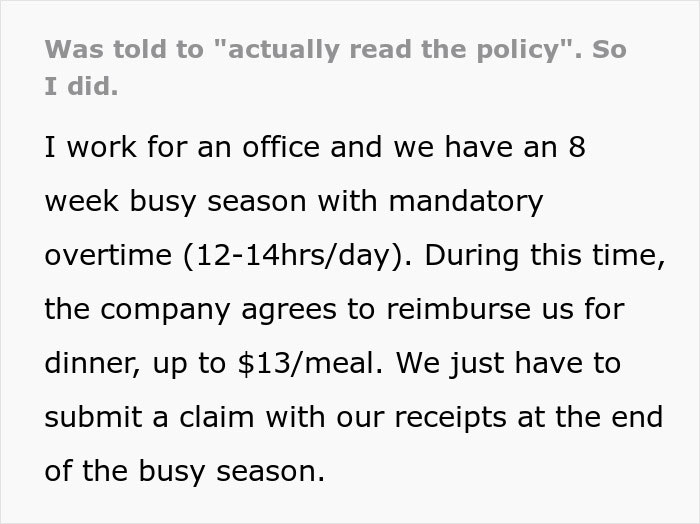

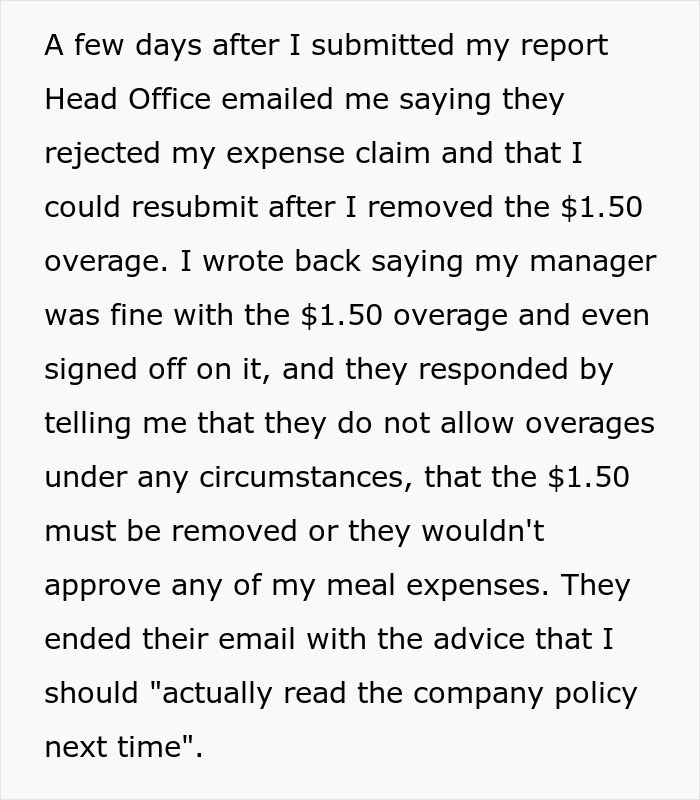








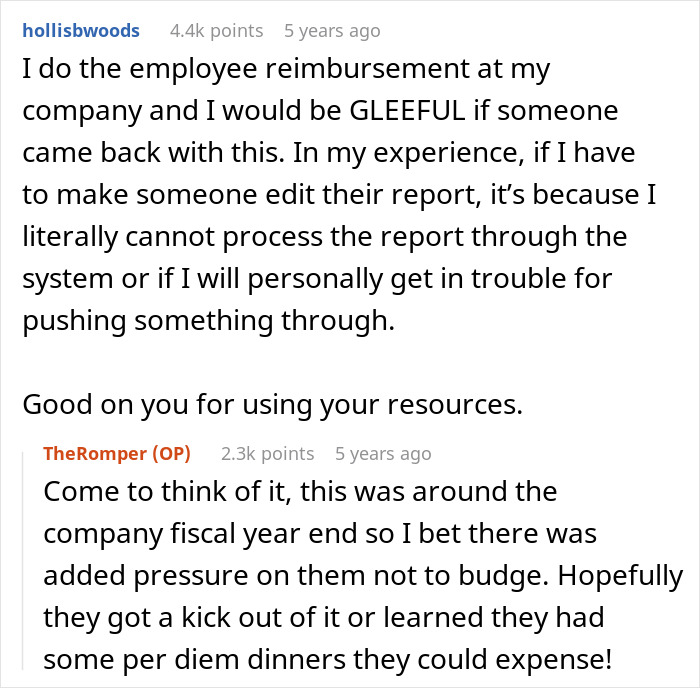

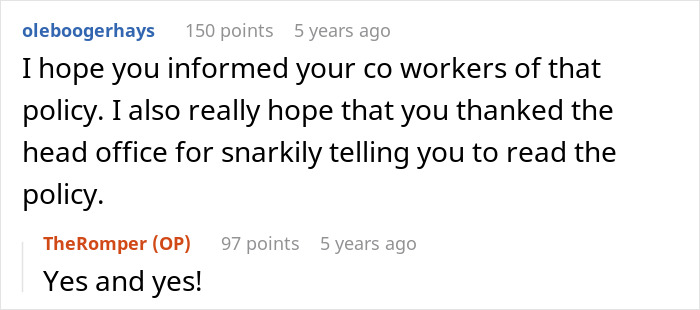
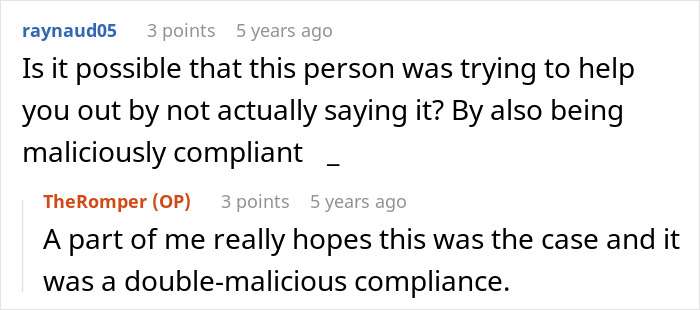



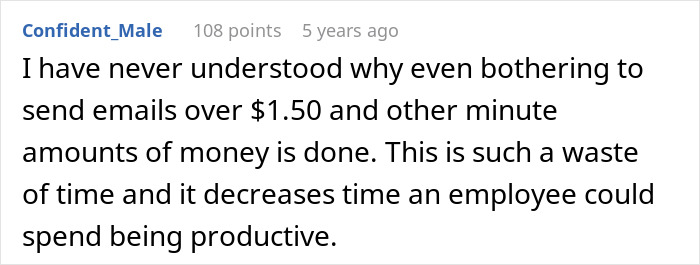









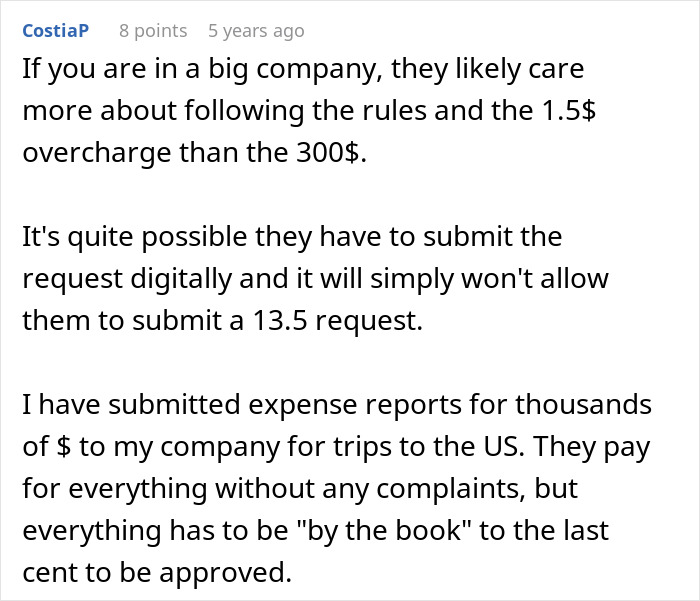
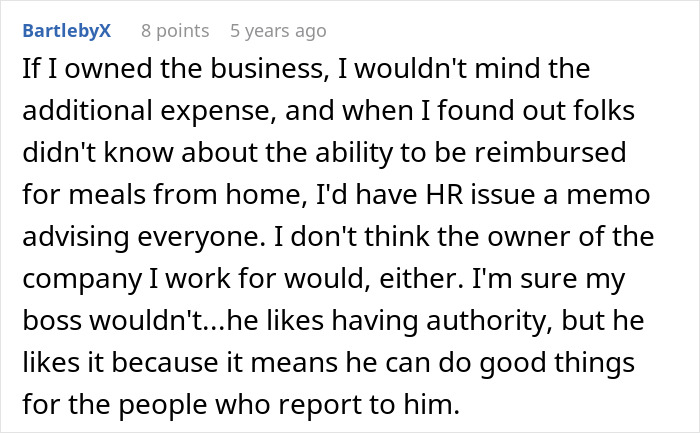













































70
13